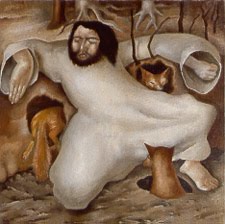 This week we have been looking closely at Luke 9:51-62. So far we have examined Jesus’ Rejection in Samaria in great detail and now we are examining the three “would-be” disciples. All the pieces to this pericope are pointing to something really amazing. Let’s start putting them all together and see what kind of picture begins to emerge.
This week we have been looking closely at Luke 9:51-62. So far we have examined Jesus’ Rejection in Samaria in great detail and now we are examining the three “would-be” disciples. All the pieces to this pericope are pointing to something really amazing. Let’s start putting them all together and see what kind of picture begins to emerge.
Verse 57
- This encounter happens along the journey. Jesus is in the process of fulfilling his mission. Although Jerusalem is not mentioned the larger context shows us his ultimate destination. This man motives are not given, but there is something about what Jesus is and is doing that attracts him to Jesus.
- The Motif of discipleship established in the travel narrative is seen strongly here. Jesus is not only on a physical path, but one of destiny.
- Main Point: The man who desires to follow Jesus encounters Jesus while he is moving. In the same way any encounter with Jesus will not find Jesus passively waiting. Becoming a disciple involves jumping on a moving vehicle already moving at full tilt.
- This verse has a lot behind it. Although Bultman argues that this passage was altered from it’s original state. He believed originally it was a parable meant to convey a parable about the nature of human existence rather then something specific that applied only to Jesus and his followers.1
- There is also a connection made by some to the Gospel of Thomas. Saying 86 in Thomas is remarkably similar.2
- 1 Enoch 42:1f talks about wisdom not finding a place to rest. Marshall believes there may be a connection with this idea of wisdom and what Jesus is doing here with himself.3
- Main Point: Although Jesus may have been using this passage to say something about himself, the main takeaway of it all is that discipleship makes us forever pilgrims and exiles on this earth. As long as we live in this world we are traveling along the hodos with Jesus, and their are no resorts along the way.
- There is a minor textual variant in this passage. Some manuscripts have the man address Jesus as Lord, and others do not. Translators go either way on this one, but it doesn’t change the overall meaning of the text.
- This time the objection was raised by the would-be follower. In the first encounter Jesus himself raises the objection.
- The call to discipleship is extended to the man by Jesus in this encounter, whereas in the previous encounter the man calls himself.
- Burying your father was a duty that was uncontested in the first century Jewish life.4
- Main Point: The life of a disciples begins the moment the call is extended, but the responsibilities of life do not go away. This would be disciple faced a conflict when he saw what discipleship looked like. Following the hodos (remember hodos means both a road and a way of life) with Jesus today is not any easier. Expect conflict if you intend to stay on the path.
- Jesus response seems shocking, but it is not without precedent. Prophets in the Old Testament had also “broken decorum” for the sake of proclaiming a message. We can see this in Jeremiah 16: 5-7 and also in Ezekiel 24:15-24
- Which dead bury which? Although most commentators believe Jesus means the spiritually dead will bury the physically dead that connection is not explicit in the text. Jesus could be making an even more extreme statement and mean they physically dead will be doing the burying. According to Nolland the former interpretation could have made sense to a Hellenistic audience, but would not have made sense to Semitic people.5
- Some have argued that this man simply wanted to go home and wait for his father to die before he left to follow Jesus. This preaches well but doesn’t hold the weight these words have if taken literally.
- In light of 1 Timothy 5:8 it may be a safe assumption that Jesus was not commanding the man to leave a father on the point of death since that would go against the teaching of the early church.
- Bockmuel thinks Jesus may have been commanding his followers to take the Nazerite Vow, but Fletcher-Louis does not believe this to be the case since Jesus’ own reputation for being a glutton demonstrate he probably was not a Nazerite himself.6
- Fletcher-Louis believes this to be a redefinition of the family of God.7
- Stein believes this passage to be a pun, but I don’t know if the man would have found it to be very funny.8
- Main Point: Jesus’ response highlights the way Jesus saw his mission. It went beyond regular duties. This journey is serious business. Although Jesus does use a play on words he is not playing around, following him is serious business and all other business must be put aside to follow him.
- This encounter is the one exclusive to Luke.
- This would-be disciple approaches Jesus, like the first one. Not the other way around.
- The mans request is the same as the request made by Elisha when he was called by Elijah in 1 Kings 19. 1 Kings 19:20 tells us that Elijah granted Elisha’s request and he was allowed to go home and say goodbye. Again we see the Elijah motif emerge.
- Main Point: This man’s request is more then a simple wish, it has undertones of what people anticipated in a prophet like Elijah who was expected to come. If you try to guess at what Jesus’ calling is you may be surprised when he fails to meet your expectations.
- Here is the plow imagery that we talked about earlier. Jesus responds to the undertones of the man’s request with a new definition of discipleship. He places his own mission above the mission of Elijah and there is a sense of urgency which is seen in this response.
- Jesus is not seen as simply a prophet here. He seems to be making a distinction between Elijah and himself.
- Nolland believes Jesus’ harshness is proof of his authenticity9 .
- Main Point: Jesus is not just a prophet, and his mission is more then people expect of him. His path is not one you go on for a time, or a season, but it is a way of life. The call of Jesus is toil and it is work, but in the end you sow the seeds of peace where God’s kingdom is present. He gives the image of a plow as a symbol of discipleship.
notes
1 Fitzmyer, J. A. The Gospel According To Luke. 2 vols. Anchor Bible. (Garden City, N.Y.:
Doubleday, 1981), 834.
2 Fitzmyer, J. A. The Gospel According To Luke. 2 vols. Anchor Bible. (Garden City, N.Y.:
Doubleday, 1981), 835.
3 Marshall, I. Howard.The Gospel of Luke. (Grand Rapids:Eerdmans, 1978), 410.
4 Fletcher-Louis,CrispinH T. “‘Leave the dead to bury their own dead’: Q 9.60 and the redefinition of the people of God.”Journal for the Study of the New Testament26, no. 1 (September 2003): 39-68.ATLAReligion Database withATLASerials,EBSCOhost(accessed November 2, 2009), 40.
5 Nolland, J. Luke. 3 vols. Word Biblical Commentary. (Dallas: Word, 1989-1993,) 543.
6 Fletcher-Louis,CrispinH T. “‘Leave the dead to bury their own dead’: Q 9.60 and the redefinition of the people of God.”Journal for the Study of the New Testament26, no. 1 (September 2003): 39-68.ATLAReligion Database withATLASerials,EBSCOhost(accessed November 2, 2009), 43.
7 Fletcher-Louis,CrispinH T. “‘Leave the dead to bury their own dead’: Q 9.60 and the redefinition of the people of God.”Journal for the Study of the New Testament26, no. 1 (September 2003): 39-68.ATLAReligion Database withATLASerials,EBSCOhost(accessed November 2, 2009), 51.
8 Stein, Robert H. Luke (New American Commentary) (Nashville, TN: B&H; Publishing Group, 1993), 301.
9 Nolland, J. Luke. 3 vols. Word Biblical Commentary. (Dallas: Word, 1989-1993,) 302.












